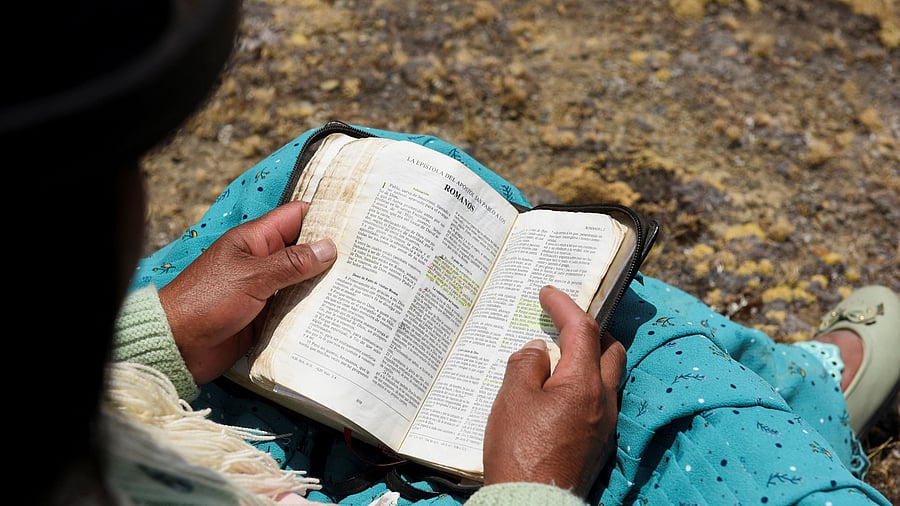
Representative image of a person reading the Bible.
Credit: Reuters
Multiple explosions occurred during a Jehovah's Witness prayer service in the Kalamassery area of Kerala's Ernakulam district on October 29 morning. The blasts have claimed the lives of three people and injured numerous others.
About 2,500 people had gathered for a Jehovah's Witness prayer service. The Jehovah's Witnesses have been around for more than a century and are quite prevalent in Kerala.
Who are Jehovah's witnesses?
The Christian organisation Jehovah's Witnesses was founded in the United States in the late 1800s. It is well-known for having unique customs and beliefs that are different from those of mainstream Christianity. The belief that Jehovah is the name of God and that the end of the world is near is fundamental to its religion.
According to Jehovah's Witnesses, all worship should be towards Jehovah. Jehovah's Witnesses hold that Jesus is not God; rather, he is 'King of God’s Kingdom in heaven' and the Saviour and the Holy Spirit is not a person; rather, it refers to God's operative power.
The group rejects the popular Christian belief in the Trinity, which is the doctrine that God, Christ, and the Holy Spirit are all aspects of one God. For them, Jehovah is the 'Universal Sovereign', the only real God, and the one who created everything.
The group is known for following the Bible with diligence since they see it as the last authority. The 66 books of the Bible, including those from the Old and New Testaments, serve as the foundation for their beliefs.
The Witnesses anticipate the establishment of God's kingdom on Earth and believe that we are in the final days of our existence.
Its beliefs state that after Armageddon, a terrible apocalypse they expect, the whole of humanity will live in a paradise on Earth, and only 144,000 people will be chosen to rule with Christ in heaven. The group's teachings say God created the earth to be mankind’s eternal home, and obedient people are promised an earthly paradise.
The group is also known for its door-to-door campaign and attempts to convert people to their beliefs.
Jehovah's witnesses origin
The Jehovah's Witnesses were first established in the United States in the 1870s as a branch of Charles Taze Russell's Bible Student movement. A set of distinctive beliefs was developed by Russell and his followers. Following Russell's death in 1916, Joseph Franklin Rutherford assumed leadership of the organisation, and in 1931 they changed their name to Jehovah's Witnesses.
Rutherford was a driving force behind the Jehovah's Witnesses' explosive growth. With its main office located in Warwick, New York, the organisation currently has 8.5 million members worldwide.
Unique practices
Unlike Christians, Jehovah's Witnesses do not celebrate holidays such as Christmas and Easter, as they believe these festivals have pagan origins.
The Witnesses oppose blood transfusions because they consider blood to be sacred and reject modern evolutionary theories. In the past 20 years, instances of parents refusing to give their ill children transfusions have made headlines.
Presence in India
The group claims that there are roughly 56,747 Ministers in India who teach the Bible. There are currently 947 congregations of the group in India.
Like their counterparts everywhere else, Jehovah's Witnesses in India participate in public witnessing activities. Bookstalls in public areas like parks, markets, and transit hubs are reportedly often set up by the group where free copies of their publications are distributed and allow individuals a chance to talk to others about their religious views.
Jehovah's Witnesses in India also reportedly have meetings and conventions regularly. Members can gather together for camaraderie, support, and religious teaching at these gatherings. The Witnesses are also very focused on education. In India, Jehovah's Witnesses reportedly run a thorough educational programme that includes Bible studies and other religious educational materials.
